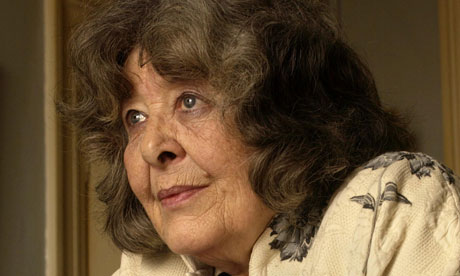Like many good writers,
Diana Wynne Jones, who has died aged 76 of cancer, worked for long years in relative obscurity, in her case sustained as a children's
fantasy author by a modestly sized but devoted young readership. That obscurity provided the freedom to develop her own voice without the distractions of having to build on perceived success. By the time real success found her, in Jones's case almost by chance, she was a mature writer with a solid and varied body of work that was ready to be appreciated by a much bigger new audience.
Her intelligent and beautifully written fantasies are of seminal importance for their bridging of the gap between "traditional" children's fantasy, as written by
CS Lewis or E Nesbit, and the more politically and socially aware children's literature of the modern period, where authors such as Jacqueline Wilson or Melvyn Burgess explicitly confront problems of divorce, drugs and delinquency.
Jones's
fiction is relevant, subversive, witty and highly enjoyable, while also having a distinctly dark streak and a constant awareness of how unreliable the real world can seem. Disguises and deceptions abound. Though avoiding criminally dysfunctional families or unwanted pregnancies, her cleverly plotted and amusing adventures deal frankly with emotional clumsiness, parental neglect, jealousy between siblings and a general sense of being an outcast. Rather than a deliberately cruel stepmother, a Jones protagonist might have a real mother far more wrapped up in her own career than in the discoveries and feelings of her child. The child protagonist would realise this, but get on with the adventure anyway.
Jones wrote from experience: her parents were neglectful of her needs, and those of her two younger sisters. The sisters often went hungry, and for years were banished to sleep in an unheated lean-to shed, to make room in case of visitors. Both parents were intellectuals and progressive educators, but were stingy not only with money but also with warmth and attention. The skinflint father bought the children a complete set of Arthur Ransome books as Christmas presents, but doled them out at a rate of one a year. In self-defence Jones began to write stories for her sisters and herself. When the second world war broke out Jones and her family were evacuated to the Lake District, eventually living in the house once inhabited by the Altounyan children, on whom Ransome had based his Swallows and Amazons series. The great children's author was still around, one day complaining angrily that the children were making too much noise. On another occasion, Diana's younger sister and a friend had their faces slapped by a second Lakeland author who hated children but who was rich and famous because of them: Beatrix Potter. Jones's distinctive scepticism about conventional children's fiction must have started to set in early.
Later, when she went to St Anne's college, Oxford, two of her lecturers were
JRR Tolkien and CS Lewis. Both were then engaged on their famous works of fantasy, but at that time fantasy was distinctly de trop at Oxford. The two professors were tolerated because they were also excellent scholars. Lewis boomed excitingly to crowded halls, while Tolkien muttered inaudibly to Jones and three other students.
Years later, just as she was starting to write and publish professionally, and was taking bed-rest because of pregnancy, Jones read Tolkien's Lord of the Rings for the first time. This made her realise that a fantasy novel could be not only long, but seriously intended too.
As she became more certain of her own writing, she also grew more sceptical of the conventional tropes of fantasy, including those of Tolkien. This questioning became overt with the publication of The Tough Guide to Fantasyland (1996). Presenting her book as a tourist guide to a foreign land, Jones, with affectionate but deadly effect, spoofed or parodied the numerous cliches that riddle those hordes of three-volume sagas about elves and quests.
Jones, of course, knew that her novels too were not immune from lampoon, but this book declared her self-awareness, the likeable distance so relished by her audience. Her growing band of readers also knew that Jones's own novels easily transcended the routine stuff of rings and magic and ancient runes.
The first of the
Harry Potter books by
JK Rowling appeared in 1997, and by the turn of the century had become a sensational success. Other publishers were looking around for books they could market to the same vast audience, and were quick to realise that Jones had been fruitfully engaged in fantasy for nearly 30 years.
Superficial similarities may be a double-edged sword; one of her series of books features a wizards' university. Among her most popular creations is the Chrestomanci series (novels and short stories – the first appeared in 1977), in which a nine-lived enchanter operates across multiple realities as a civil servant in charge of preventing the abuse of magic; the series includes an idiosyncratic school story, Witch Week (1982). Of the apparent coincidences, Jones said generously to this newspaper in 2003: "I think that she [Rowling] read my books as a young person and remembered lots of stuff; there are so many striking similarities."
Her career began as a playwright, with three plays produced in London between 1967 and 1970; her first novel, Changeover (1970), was adult humour; since then her work has been written for younger readers. Besides the two series already mentioned, she wrote the Howl books, beginning with Howl's Moving Castle (1986; filmed in 2004 by Hayao Miyazaki), and two sequels, and the Dalemark sequence (1975-2003), dark-tinged fantasies set in that eponymous country.
Some of her best and most enjoyable books are stand-alones, in particular The Ogre Downstairs (1974), The Time of the Ghost (1981) and Fire and Hemlock (1985), each a remarkable blend of pathos and genuinely funny writing. Archer's Goon (1984), extravagantly mixing fantasy with
science fiction, was serialised for television by the BBC in 1992. Her most recent novel, the light-hearted Enchanted Glass, appeared last year.
Jones won innumerable awards for her writing, including three Carnegie commendations, the Guardian award and a lifetime achievement World Fantasy award. In 2006 she was made an Honorary DLitt by the University of Bristol. She was amused by the considerable academic attention her work attracted; reading in one paper that her work was "rooted in fluidity", she remarked: "Obviously hydroponic, probably a lettuce, possibly a cabbage."
Jones was born in London of Welsh parents; she met her husband-to-be, the Chaucerian scholar John A Burrow, just before she went up to Oxford; they married in 1956 and had three sons, Richard, Michael and Colin, all of whom survive her, as do five grandchildren.
• Diana Wynne Jones, writer, born 16 August 1934; died 26 March 2011


